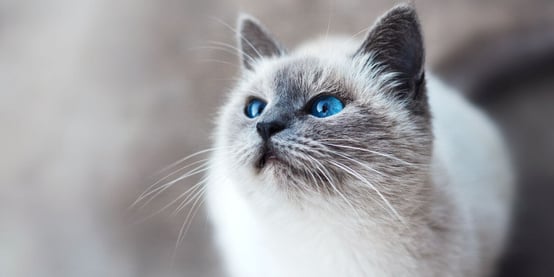There are many things that cats can’t eat, like chocolate, onions, and caffeine, just to name a few. On the other hand, there are some surprising “human” foods that are safe for cats, like some yummy yogurt or mouth-watering melon.
So it’s no surprise that there can be some confusion about what cats can and can’t eat. As an attentive pet parent, you’re in the right place to do some research to ensure what you’re giving your cat is safe and digestible.
Are avocados on the “yum” or “yuck” list? Read on to find out.
Are Avocados Bad for Cats?
.png?width=1600&height=800&name=FUR-Blog-Can%20cats%20eat%20avocado%202%20(1).png)
Photo by Gil Ndjouwou on Unsplash
The answer as to whether avocado is safe for cats is… it depends.
Certain parts of the avocado – the skin, pit, and leaves – are toxic to cats. These things contain persin, a highly toxic fatty acid derivative that can lead to all kinds of complications!
That said, the “meat” (or “flesh”) of the avocado is typically considered safe for cats in very small (and infrequent) quantities.
But the answer doesn’t stop there…
Avocado flesh
While technically cats can eat avocado flesh in very small quantities, it still contains some persin so this should be avoided. Avocado flesh has no known nutritional benefit to cats, and in fact is very high in calories and fat, so you might as well skip it!
Avocado pit
In addition to containing a high concentration of persin, avocado pits are a choking hazard. Do not give an avocado pit to your cat.
Avocado skin
The skin of the avocado should be strictly off-limits to your cat as well. The high concentration of persin can be toxic to your cat.
Call your veterinarian immediately if you think your cat may have eaten avocado leaves, skin, or pit.
How Much Avocado Can Cats Safely Eat?
It's best to avoid giving avocado to cats entirely. Due to its persin content, many parts of an avocado can lead to vomiting, diarrhea, and abdominal pain. Even for low-persin avocado flesh, feeding this to your cat should be avoided.
What Happens if a Cat Eats Avocado?
.png?width=1600&height=800&name=FUR-Blog-Can%20cats%20eat%20avocado%203%20(1).png)
Photo by Paul Hanaoka on Unsplash
If a cat eats avocado skin, pit, or leaves, or a large amount of avocado flesh, they are at risk of persin toxicity. Signs of illness from persin toxicity can include:
- Vomiting
- Diarrhea
- Abdominal pain
- Lethargy
- Difficulty breathing
- Coughing
- Congestion
If your cat is exhibiting any of these symptoms and/or you suspect they have consumed avocado pit, leaves, or skin, call your veterinarian immediately.
Can Cats Eat Guacamole?
Nope! Cats should not eat guacamole, as it contains several ingredients that can be harmful to cats, including:
- Avocado: Contains persin, which can cause vomiting and diarrhea
- Onions and garlic: These can be toxic and lead to gastrointestinal upset and damage to red blood cells
- Lime or lemon juice: The acidity can cause digestive issues
- Salt: High levels of salt can lead to excessive thirst, urination, or even sodium ion poisoning (severe cases)
- Spices and seasonings: Many seasonings can irritate a cat's digestive system or even be toxic
As much as your cat might want to take part in the fiesta, don’t let them partake in the guacamole dip!
Can Cats Eat Avocado Oil?
Nope! Avocado oil can trigger a sensitivity in cats and can even lead to inflammation of the pancreas (pancreatitis).
Skip the Avo, Feed These to Your Cat Instead!
.png?width=1600&height=800&name=FUR-Blog-Can%20cats%20eat%20avocado%204%20(1).png)
Photo by Divani on Unsplash
If you’re looking for fruits or vegetables that are high in nutritional value for your cat, here are a few delicious (and safe) options. Skip the avocado and incorporate these yummy treats instead:
- Blueberries: Blueberries are high in antioxidants, fiber, and vitamins, and are safe for cats
- Apples: This fruit provides vitamins A and C, and is safe for cats. Just be sure to remove the seeds and core before feeding.
- Bananas: Bananas are a good source of potassium and fiber, and can be safely added to your cat’s food as a treat
- Cantaloupe: Cantaloupe is rich in vitamins A and C, and can provide hydration due to its water content
- Carrots: Carrots are safe for cats and are rich in beta-carotene and fiber. Carrots are best served cooked or raw in small pieces.
- Peas: These are a good source of vitamins A, C, and fiber. Can be served fresh or cooked.
- Broccoli: Safe for humans and cats, broccoli contains fiber and vitamins. Serve this in small, cooked pieces
Find additional resources about cat feeding, health care, and more on our blog!
Better Safe Than Sick – When to Ask Your Vet
When in doubt, it’s always best to ask a trusted veterinarian whether a particular food is safe for your cat. Beyond the commonly known toxins, every cat has different sensitivities and dietary restrictions. You (and your vet) know your cat best, so it’s better to be safe than risk it with a food you just aren’t sure about!
Occasionally, new foods just won’t sit well with our feline friends, leading to vomiting, diarrhea, and more. If this occurs, always consult a veterinarian right away. They will be able to advise on the proper course of treatment.
Furkin Pet Insurance provides the coverage and peace of mind you need no matter what pet ownership throws your way. Whether it’s a cat fight, a winter cold, or a new food that just didn’t sit right, having pet insurance to cover emergency vet bills can be a huge relief. Contact us for a free quote for reliable pet insurance today.
Featured image by Laura Chouette on Unsplash



